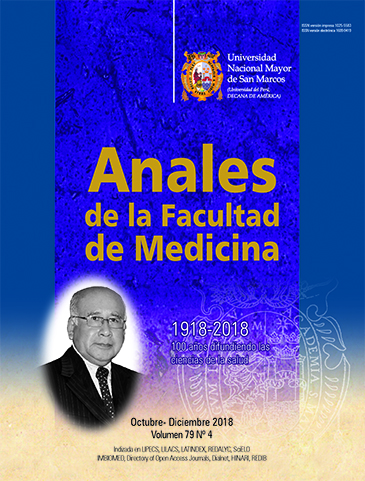The transfer knowledge for the development of clinical guidelines informed on evidences
DOI:
https://doi.org/10.15381/anales.v79i4.15644Keywords:
Practice Guideline, Evidence-Based Practice, PeruAbstract
This article shares the experience of the technology transfer (TT) developed by the Peruvian National Institute of Health (INS) towards the multidisciplinary clinical groups of different IPRESS and managers of the Ministry of Health (MINSA), inside the framework of the development of guidelines for Clinical Practice-Informed in Evidence (GPC-IE). It presents the evolutionary context of the CPG together with the role assumed by the INS, in their development of current regulations and in their implementation. It expresses the inherent situation to operationalization of the process that were not initially contemplated in the guideline and the contributions made to afford it; as the variability of the prioritization strategies of topics to be developed, the additional characteristics of the development group (GE) and methodology group (GM), the relevance of the management group, the pedagogical strategies used for the management of the clinical groups, the additional precisions that were carried out in relation to the declaration of conflict of interest (DCI) in order to contribute to transparency, and to strengthen the assumed TT. It shows the strategies used to assess the perspectives and preferences of patients. Finally it expresses the results and the challenges in the continuous TT in the framework of GPC-IE.Downloads
Published
2018-12-30
Issue
Section
Guías de Práctica Clínica
License
Copyright (c) 2018 Anales de la Facultad de Medicina

This work is licensed under a Creative Commons Attribution-NonCommercial-ShareAlike 4.0 International License.
Those authors who have publications with this magazine accept the following terms:
- Authors will retain their copyrights and guarantee the journal the right of first publication of their work, which will be simultaneously subject to Creative Commons Attribution License that allows third parties to share the work as long as its author and its first publication this magazine are indicated.
- Authors may adopt other non-exclusive licensing agreements for the distribution of the version of the published work (eg, deposit it in an institutional electronic file or publish it in a monographic volume) provided that the initial publication in this magazine is indicated.
- Authors are allowed and recommended to disseminate their work over the Internet (eg: in institutional telematic archives or on their website) before and during the submission process, which It can produce interesting exchanges and increase quotes from the published work. (See El efecto del acceso abierto ).
How to Cite
1.
Carmona Clavijo G, Bonilla Untiveros C, Reyes Puma N, Huamán Sánchez K, Castillo Villacrez C, Caballero Ñopo P. The transfer knowledge for the development of clinical guidelines informed on evidences. An Fac med [Internet]. 2018 Dec. 30 [cited 2025 Jun. 6];79(4):360-6. Available from: https://revistasinvestigacion.unmsm.edu.pe/index.php/anales/article/view/15644



